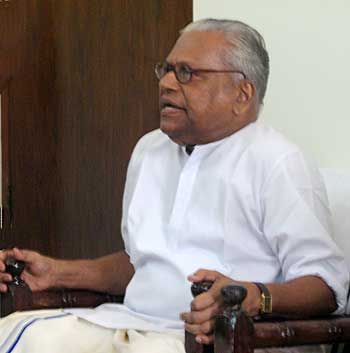Achuthanandan proves himself to be a master of tactics; saves his position once again

CPI (M) leader V. S. Achuthanandan
Though a strategic move, Opposition Leader V. S. Achuthanandan has saved his position as Leader of the Opposition once again. However, for a second time, the party has censured him.
The State unit had been seeking disciplinary action against the Opposition Leader for openly supporting the agitation against Kudankulam nuclear plant. This would even have led to his eventual removal from the position of the Leader of the Opposition.
In a pre-emptive move, Mr. Achuthanandan asked the Central leadership of the party to change party line on Kudankulam. Though the politburo rejected his demand noting that the party line was adopted at the Party Congress, the demand for action against the Opposition Leader got dented though the ensuring discussion in the polit bureau and the Central Committee. There was some support among leaders from other States to Mr. Achuthanandan’s demand that the party should support the agitation against Kudunkulam plant. Moreover, the dichotomy between the party’s stand on Kudankulam and the Jaitapur plant came to the fore though the Central Committee resolution offered some explanation for that. The Committee also called for an independent safety review of Kudankulam nuclear plant and condemned repression of people agitating against its commissioning. “Necessary safety measures must be put in place before the reactors are commissioned.” It said.
However, Mr. Achuthanandan proved that he can still take on the State leadership of the party. He had gone to express his support for those agitating against the plant in Tamil Nadu, defying the official leadership of the party in Kerala and general secretary Prakash Karat. Mr. Achuthanandan, who is credited with participation in the Punnapra Vayalar uprising, had just returned when stopped by Tamil Nadu police at the border. He knew that if he had gone into Tamil Nadu and got arrested, he would find none of his party leaders in Kanyakumari district would be there in his support.
The following is the full text of the Central Committee resolution:
Resolution on Comrade V. S. Achuthanandan’s Stand on Kudankulam Nuclear Plant
The Central Committee reiterates the approach of the Party on the use of nuclear power for civilian purposes. The Political Resolution adopted by the 20th Congress of the Party has opposed the setting up of nuclear parks with imported nuclear reactors which are a consequence of the Indo-US nuclear deal. These are not viable on technical and economic grounds and also from the point of view of safety.
In the case of the Kudankulam reactors, the resolution has made an exception as the agreements for these reactors were signed two decades before the Indo-US nuclear deal, at a time when the US and other western countries had imposed sanctions on India. Since then, two reactors from Russia have already been constructed at considerable cost and they are at the final stage before commissioning. However, the resolution has stressed that given the local people’s apprehensions about their safety and livelihood after the Fukushima accident in Japan, these concerns should be met. There should be an independent safety audit and necessary safety measures must be put in place before the reactors are commissioned.
Such an independent safety review has not been conducted. In the meantime, the people protesting at Kudankulam have been subjected to police repression and a large number of cases have been foisted against them. The Party has condemned the repression and demanded that the cases of sedition and other charges be withdrawn.
Com. V.S. Achuthanandan has taken a position contrary to this stand. He has also criticized the Party’s position on Kudankulam as explained by the General Secretary. The Central Committee rejects his views. It censures him for his refusal to abide by the stand which was worked out at the Party Congress. The Central Committee directs Com. V.S. Achuthanandan to adopt the stand taken by the Party.
Leave a Response »

 When two children quarrel, some patients punish both children equally. They know that it is tricky to enquire into the reasons for the quarrel, who started the bouts and who received the most.
When two children quarrel, some patients punish both children equally. They know that it is tricky to enquire into the reasons for the quarrel, who started the bouts and who received the most.

 What happened in the walled venue modeled like red fort and culminated on the arena modeled like Roman coliseum was the fight between two factions in the Kerala unit.
What happened in the walled venue modeled like red fort and culminated on the arena modeled like Roman coliseum was the fight between two factions in the Kerala unit.